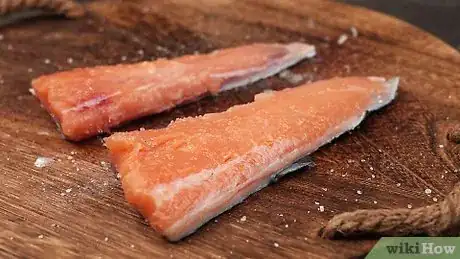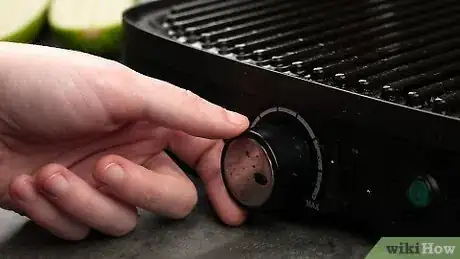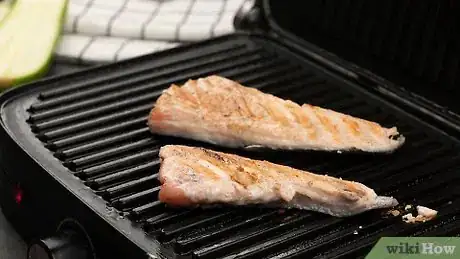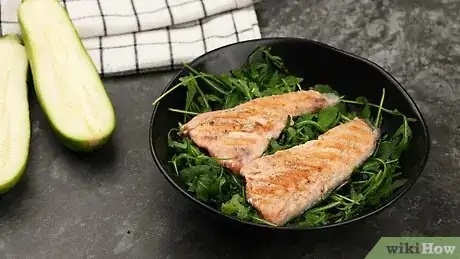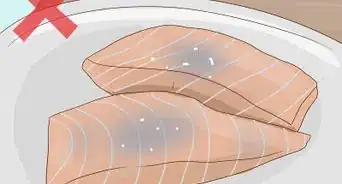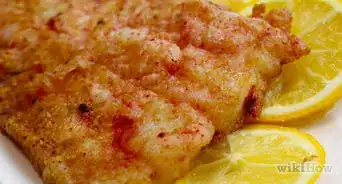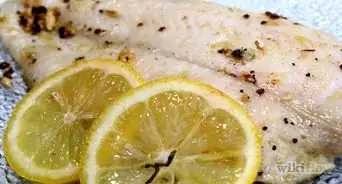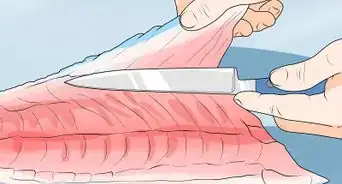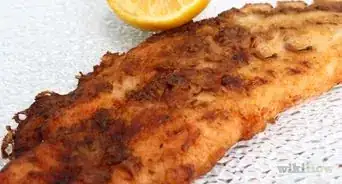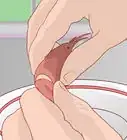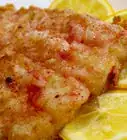This article was co-authored by Ollie George Cigliano. Ollie George Cigliano is a Private Chef, Food Educator, and Owner of Ollie George Cooks, based in Long Beach, California. With over 20 years of experience, she specializes in utilizing fresh, fun ingredients and mixing traditional and innovative cooking techniques. Ollie George holds a BA in Comparative Literature from The University of California, Berkeley, and a Nutrition and Healthy Living Certificate from eCornell University.
This article has been viewed 28,358 times.
For a delicious but healthy meal, grill up some salmon with the skin on. Make sure the salmon is deboned and cut up evenly before placing it on a well-oiled grill. Cook the meat side first with a sprinkle of salt to prevent it from sticking. Then cook the salmon with the skin down until it’s pink and flaky. Grilling salmon with crunchy skin isn’t complicated at all, so give it a try!
Steps
Cleaning and Seasoning the Salmon
-
1Pull any pin bones out of the salmon. Lay the salmon on a cutting board skin-down. Run your fingers over the meat to feel for any small, hard lumps. Grasp the ends of the bones with needle-nose pliers or tweezers and pull them out at an angle.[1]
- Try to pull the bones out at the angle they are pointing. Pulling them straight up will tear the fish.
-
2Cut the salmon into fillets. Use a sharp knife to divide larger pieces of salmon into fillets about 1 1⁄2 to 2 in (3.8 to 5.1 cm) wide. The pieces don’t have to be perfect, but try to keep them roughly the same size so they cook at the same rate.[2]Advertisement
-
3Season the fish with a sprinkle of salt. Sprinkle a pinch of kosher salt evenly on each piece of salmon. The salt will prevent the fish from sticking to the grill.[3]
- You can also marinate your salmon! Just refrigerate it in a bowl or shallow dish of marinade for a few hours before cooking it.
-
4Let the salmon rest for 20 minutes. Leave the salmon out so that it reaches room temperature. It’s best to do this as the grill heats. If you plan on marinating your salmon, this is also the perfect time to let the salmon rest meat-side down in the marinade.
- You could use a basic teriyaki marinade, for example, made with soy sauce, ginger, garlic, and brown sugar.[4]
Cooking the Salmon
-
1Lightly oil the grill with a paper towel. Wad up a paper towel and pour some vegetable oil onto it. Using tongs, wipe the paper towel over the grill grate. Make sure you only apply a thin coating of oil so that the fire doesn’t flare up.[5]
-
2Preheat the grill to a medium high heat. A medium-high temperature equals about 375 °F (191 °C), if your grill has a thermometer. To test the grill later, hold your hand over it. It should feel so hot that you can only hold your hand over it for 1 second.
-
3Grill the skinless side for 5 minutes. Spread the fillets on the grill skin-side up so they all cook evenly. Avoid touching the salmon until you’re ready to flip it. When the salmon is done, the meat will begin curling away from the grill.
- This helps seal in all the flavors and makes it easier to flip.
- If you like the skin extra crispy, you can cook the skin side first instead.
-
4Flip the salmon with a spatula or tongs. If the salmon sticks to the grill when you try to flip it, it most likely isn’t done, so let it cook for another minute.
-
5Grill the skin side for 10 minutes. After about 6 minutes, the salmon will begin to appear pink in the middle, and after 10 minutes, it will be fully cooked through. Salmon that is done looks very pink and flaky. It feels firm to the touch instead of soft and spongy.[6]
- Depending on the grill and the thickness of the fillets, your salmon may need more time to cook.
- As the salmon cooks, white foam called albumin will appear. A little bit is normal, but if your salmon is covered with it, that means it’s overcooked. Remove the salmon when you notice the white spots forming.
-
6Move the salmon to a serving plate and let it rest for 2 minutes. Use a metal spatula to pick up the salmon and place it on a plate. No matter how delicious it looks, give it 2 minutes of resting time. The fish will continue cooking due to residual heat.[7]
Expert Q&A
-
QuestionWhich type of salmon should I buy?
 Ollie George CiglianoOllie George Cigliano is a Private Chef, Food Educator, and Owner of Ollie George Cooks, based in Long Beach, California. With over 20 years of experience, she specializes in utilizing fresh, fun ingredients and mixing traditional and innovative cooking techniques. Ollie George holds a BA in Comparative Literature from The University of California, Berkeley, and a Nutrition and Healthy Living Certificate from eCornell University.
Ollie George CiglianoOllie George Cigliano is a Private Chef, Food Educator, and Owner of Ollie George Cooks, based in Long Beach, California. With over 20 years of experience, she specializes in utilizing fresh, fun ingredients and mixing traditional and innovative cooking techniques. Ollie George holds a BA in Comparative Literature from The University of California, Berkeley, and a Nutrition and Healthy Living Certificate from eCornell University.
Private Chef & Food Educator You have two choices—wild-caught or farm-raised salmon. Farm-raised salmon has a milder flavor and a buttery texture, while wild salmon is leaner, pinker, and higher in certain minerals (though it's a little more expensive). Both are delicious, but you may want to look into the farming practices and choose the most sustainable seafood.
You have two choices—wild-caught or farm-raised salmon. Farm-raised salmon has a milder flavor and a buttery texture, while wild salmon is leaner, pinker, and higher in certain minerals (though it's a little more expensive). Both are delicious, but you may want to look into the farming practices and choose the most sustainable seafood.
Things You’ll Need
- Cutting board
- Needle-nose pliers
- Knife
- Grill
- Paper towel
- Spatula
- Plates
References
- ↑ http://dish.allrecipes.com/are-you-doing-this-before-you-cook-salmon-you-really-should/
- ↑ http://www.simplyrecipes.com/recipes/easy_grilled_salmon/
- ↑ http://www.foodnetwork.com/how-to/articles/how-to-grill-salmon-a-step-by-step-guide
- ↑ http://www.simplyrecipes.com/recipes/easy_grilled_salmon/
- ↑ http://www.seriouseats.com/2010/04/how-to-clean-your-grill-barbecue-oiling-thegrate-charcoal.html
- ↑ http://www.foodnetwork.com/how-to/articles/how-to-grill-salmon-a-step-by-step-guide
- ↑ http://www.foodnetwork.com/how-to/articles/how-to-grill-salmon-a-step-by-step-guide
About This Article
To grill salmon with skin, wipe the grate of the grill with a thin layer of cooking oil to ensure that the skin doesn’t stick to the surface, and preheat the grill to a medium-high heat of about 375 °F. Once the grill is at the appropriate temperature, place the salmon skinless side down on the grill, and let it cook for 5 minutes. Then, use a pair of tongs to flip the salmon so that the skin side is facing down, and let it cook for 10 minutes. Remove the salmon from the grill and let the meat rest for 2 minutes before serving! For more tips, including how to season your salmon for the best flavor, read on!

